12 Mistakes Everyone Makes When Grilling Fish, According To A Chef
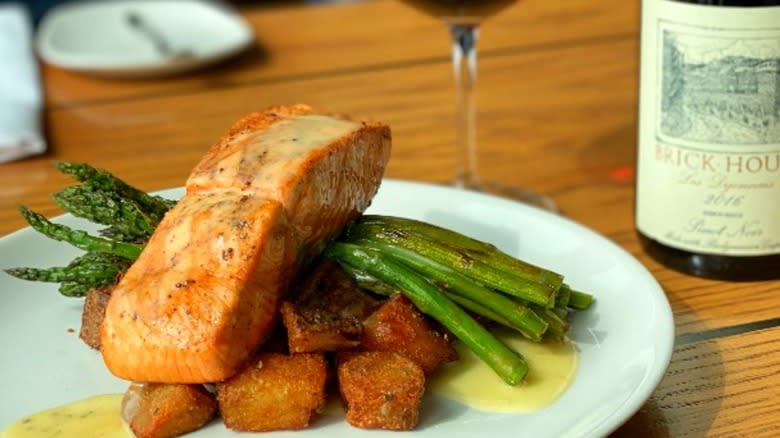
It can seem daunting to master the art of grilling fish. But if you're determined to break out your grill and impress your dinner guests, you'll be happy to hear that grilling up a delicious filet isn't as far-off as it may seem. With that said, there are a few common blunders probably preventing home chefs from getting the perfect sear. Fortunately, we found an expert seafood chef to help round up the biggest mistakes that come with grilling fish.
We spoke to the executive chef of one of Seattle's finest seafood restaurants, Ray's Boathouse and Cafe. Chef Kevin Murray has been working at Ray's since 2014, and he knows absolutely everything there is to know about preparing fish. Not only does the restaurant have access to the freshest local catches, but Murray has all the know-how needed to create the perfect seafood dishes. When it comes to the art of grilling seafood, there's no better expert to give advice on the subject. Ready to get started? Here are a few mistakes you might be making when grilling fish.
Read more: 21 Delicious Ways To Use Up Leftover Rice
Picking The Wrong Kind Of Fish
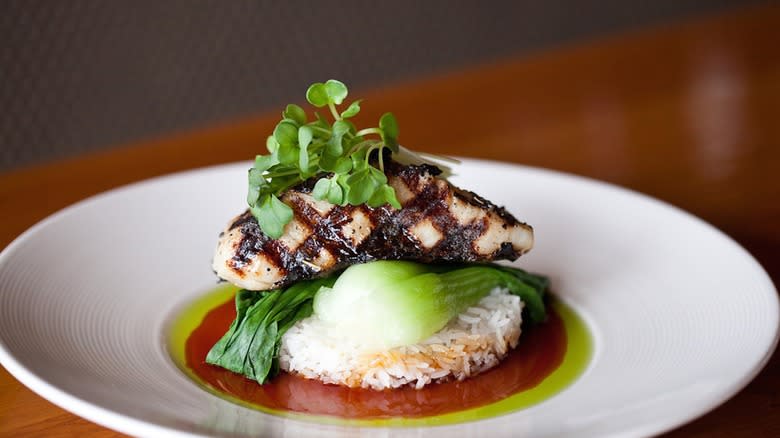
If you've been struggling to properly grill a piece of fish, start by looking at what you've been grilling. Some types of fish are much easier to grill than others. When you're a beginner, it's important to choose a species that will be relatively easy to grill. Depending on what you're working with, you may notice that some fish are easier to cook correctly and some stick to the grill less.
So, what's the best way to find an easy fish to grill? Chef Kevin Murray recommended sticking with fattier fishes to start. "Their natural fat content helps keep them from sticking, while also keeping them from drying out from overcooking," he said. He also has two recommendations for fatty fish that are simple to grill: "Sablefish and wild-caught salmon are great options for beginners." Sablefish (or black cod) is a rich fish with high oil and fat contents, while wild salmon is a popular fish for grilling (also because of its fattiness).
Not Cleaning Your Grill
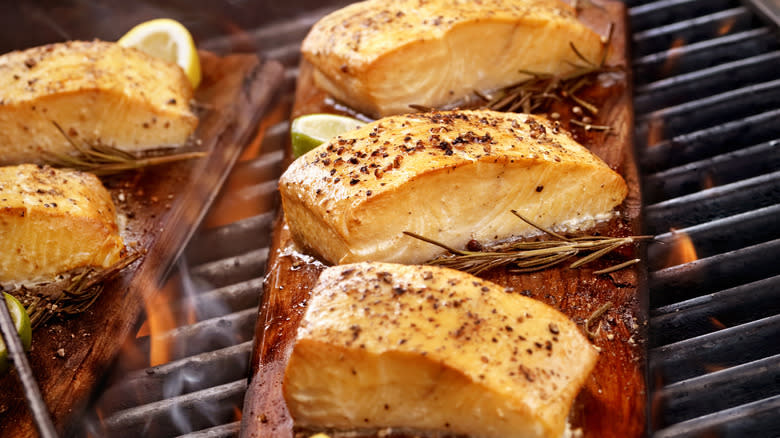
Once you've picked out your fish, it's time to get your grill ready. One of the biggest mistakes you can make right off the bat is not cleaning your grill properly (or worse, not bothering to clean it at all). Before you even think about grilling your fish, clean off the grates. "Scrape the grates carefully using a grill brush," Chef Kevin Murray recommends. This will prevent burnt food from adding unwanted flavor to your fish. Additionally, dirty grates mean your fish is much more likely to stick to the grill — even when you've done everything else right.
Cleaning your grill between uses doesn't require anything more than a grill brush. For a better clean, Murray also recommends heating your grill before you clean it. This can loosen food that's been burnt onto the grill, making the cleaning process much faster. As long as you're consistent about cleaning your grates, there's no need to worry about deep cleaning any more than once a year or so.
Forgetting To Prep Your Grill
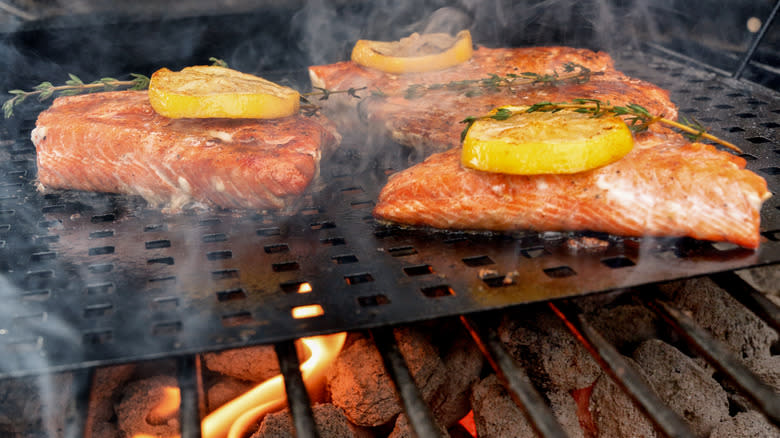
Before you drop your fish filets onto the grill, you have a little more prep work to do. Chef Kevin Murray notes that it's extremely important for you to prepare the grill itself before you start grilling your fish. First, let your grill heat up before you use it — Murray recommends a heating time of around 10 minutes (this is also the perfect time to break out your grill brush and give the grates a good scrub). Once it's heated, it's time for you to add oil.
"Oil your grill with a high smoke point oil, such as canola, avocado, or grape seed oil," Murray recommends. The smoke point of an oil is the temperature at which it starts burning. High grilling temperatures can reach well over 400 degrees Fahrenheit — if your oil starts to burn, it will transfer its burnt flavor to the fish you're cooking. To avoid accidentally ruining the flavor of your dish, use a type of oil that won't burn at high temperatures.
Not Understanding Fish Skin
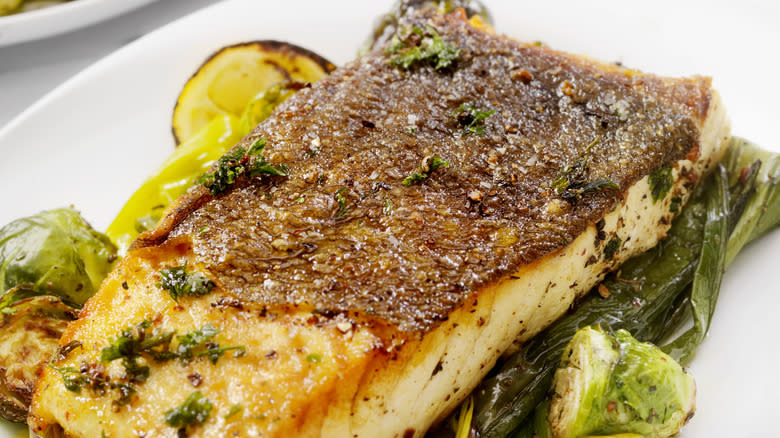
One question that always pops up when grilling fish is whether you should be leaving the skin on or off. If you're not a fan of the texture of fish skin, it's not necessary to leave it on. But it can also be useful to grill fish with the skin intact. "Skin acts as an insulator," says Chef Kevin Murray, "so cooking fish skin side down will slow down the heat transfer from the grill to the flesh of the fish. The skin will shield the fish filet from the direct heat of the grill and allow ambient heat to slowly cook the flesh while the skin gets nice and crispy (always my favorite part)."
Another thing you'll probably also notice when cooking fish skin-on is that the skin can help prevent the fish from sticking to the grill or falling apart as it's cooked. Always grill with your fish skin-side down and wait to flip it when it's almost done cooking. This will ensure the skin of your fish is crispy and minimize sticking.
Not Preventing Sticking
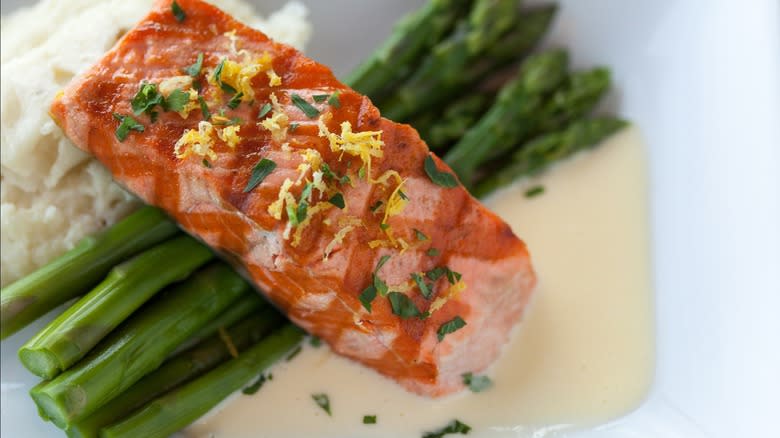
If you're following Chef Kevin Murray's tips, you shouldn't be having any problems with your fish sticking. He recommended cleaning and oiling the grates and heating the grill before cooking your fish to prevent it from sticking. Another tip he mentioned for beginner grillers is to make sure that your fish is dry before you start grilling.
Regarding the worst mistake someone could make when grilling, Murray says, "Hands down, cold grill, wet fish. Without fail this will result in the fish sticking to the grill, and frustration from the cook." Putting a wet piece of fish onto the grill will cause it to steam and prevent it from crisping properly, making it more likely to stick to the grates. Wondering how you can dry out your fish before you grill it? Just gently pat the filet dry with a paper towel to soak up any extra water.
Once all the excess moisture has been removed from the fish, you're ready to start cooking. Be aware that grilling a dry fish refers to the fish itself, not the lack of oil or marinade! Pat your fish dry before putting on rub, marinade, or oil to prevent it from being steamed, but don't shy away from applying plenty of oil to both the fish and your grill grates. This is another essential step that ensures your fish won't stick to the grill while it's cooking.
Not Preparing Fish Before Grilling
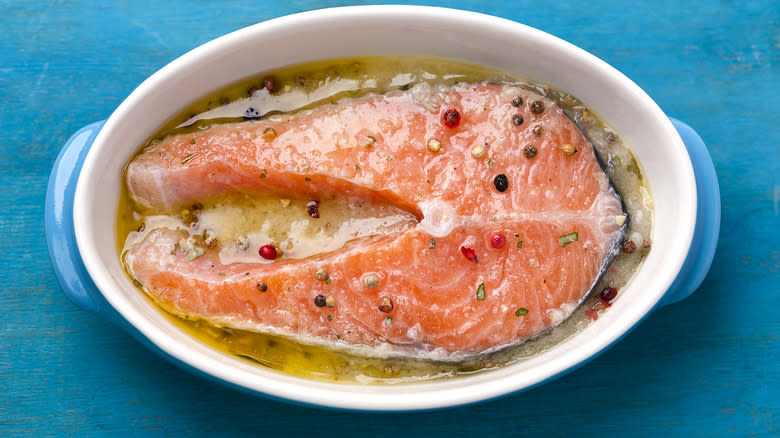
So your grill's clean and ready to use, but what about your fish? Before you fire up your barbeque, you need to prepare your fish to be cooked — and we're not just talking about cleaning and fileting it. As with pretty much any method of cooking meat, season your fish before grilling it — and strongly, too! When you add seasonings after meat is cooked, they'll just bounce off the top and won't provide much flavor to the dish. That's why it's important to use a marinade, rub, or seasoning on your fish before you start grilling
If you're not planning on using a rub or marinade, liberally oil your fish (with a high-smoke-point oil) and then thoroughly salt it. Gently rub the salt into the surface of the fish filet along with the oil, dissolving it. Use more salt than you think you need — a lot of the salt will be removed from the fish during the grilling process. You want to form almost a crust of salt along the surface of the fish to highlight the filet's natural flavor and allow the salt to actually stick around after you're finished grilling.
Picking The Wrong Rub Or Marinade
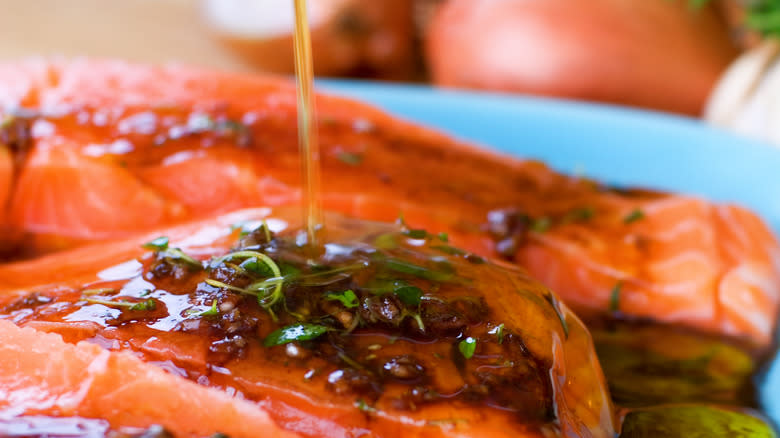
Marinading or adding a seasoning rub (like our cajun spice mix) to your fish before grilling it is the best way to give it extra flavor. If you're not planning on sticking to a basic salt rub, then a marinade or rub is the way to go. Note that if you do use a rub or marinade, it will typically have salt (and other seasonings) in it, so you won't need to use both a marinade/rub and salt your fish. Choose one or the other to prevent the flavor from being too overpowering.
Chef Kevin Murray has a favorite way to marinade fish — by keeping it straightforward. "I'll typically reach for some sliced lemon, extra virgin olive oil, and herbs such as thyme, oregano, or rosemary," he said. He's got the right idea — if you're working with a good cut of fish, you won't need to overcomplicate things. Subtle flavors will work just as well as strong ones when it comes to a good filet of fish and a masterful grill. This is probably also why one of Murray's favorite dishes at Ray's Boathouse is sablefish marinated in sake kasu (the lees leftover from making sake). "When grilled, the sugars from the marinade beautifully caramelize, leaving a wonderfully bronzed fish," he said.
Overcrowding The Grill
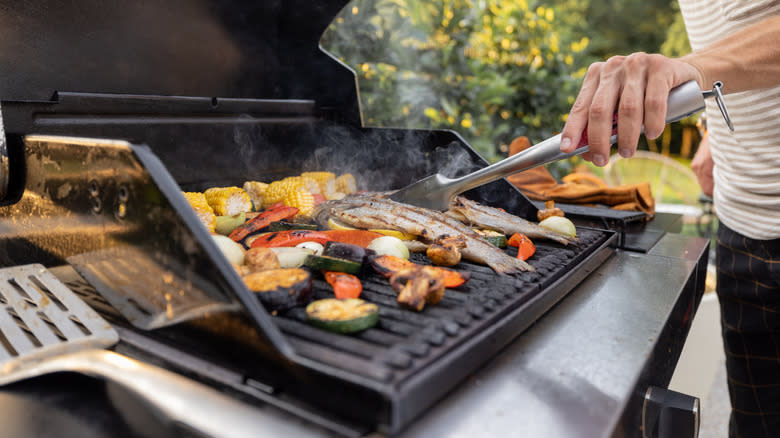
One of the more common mistakes Chef Kevin Murray noted is when home cooks overcrowd their grills. "Putting too many things on a grill will cool down your grill, and often cause things to stick," Murray advised. Trying to speed up your grilling process by grilling too much at once won't achieve the results you're looking for. For a good sear, you need to keep your items properly separated.
"Try to keep a couple inches of space between items to give them room to breathe," Chef Murray recommended. This will help ensure the grill stays hot and all your filets cook properly. If you don't have enough space for everything at once, the general rule of thumb is to cook your meat before grilling any vegetables. This way, your fish will have time to rest for a little bit and you'll be able to turn down the heat to grill your sides.
Grilling Your Fish For The Wrong Amount Of Time
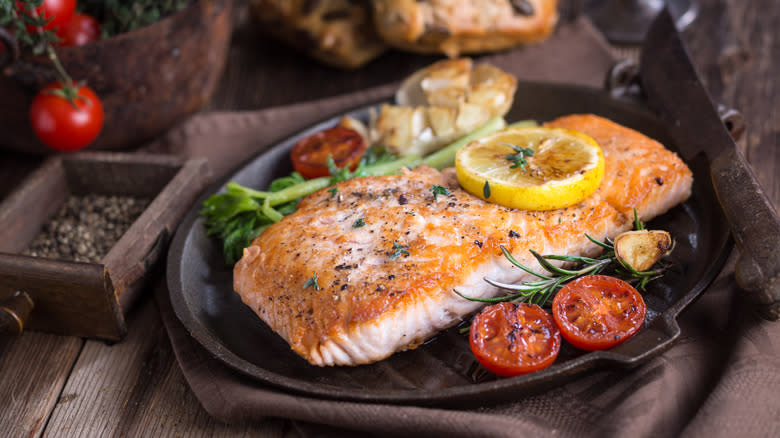
One popular rule of thumb when grilling is to cook your meat for around 10 minutes per 1 inch of fish. It's important to note that you should be measuring your fish by thickness, not by total surface area. If your fish is 1 inch thick, you can grill it for about five minutes on each side according to this rule.
Undergrilling your fish will, of course, leave you with undercooked flesh in the center of your meat. If you overcook your fish, however, you'll dry it out. Grilled fish can sometimes fall apart when overcooked — another problem when you're trying to achieve the perfect sear. Depending on the kind of fish you're grilling, you'll need to adjust the per-inch rule of thumb. Tuna, for example, is often served rare, and swordfish and salmon can also take less time on the grill. When in doubt, look up average cook times for the type of fish you're grilling to ensure you'll get the most out of your filet. You can also ask the fishmonger you're buying from to advise you on fish cook times.
Not Recognizing When Your Fish Is Done Cooking
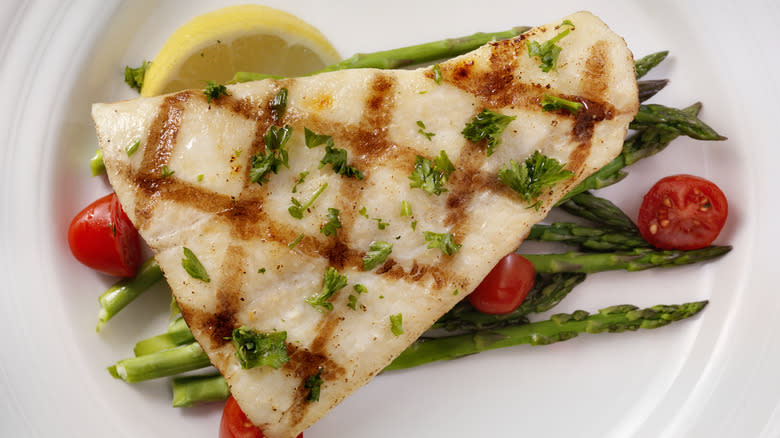
If you don't have an internal thermometer handy, you might be wondering how to tell whether or not your fish is done grilling. Fortunately, Chef Kevin Murray noted that it's actually pretty easy to determine when your fish is ready — as long as you've set up your grill properly. "If you have succeeded in your setup (clean, hot, oiled grill and dry fish), a handy tip for knowing when fish is ready to flip is whether it easily lifts off the grill grates," he said. "If it does, you are sure to have some great grill marks, if it seems stuck, typically it just needs a little more time." Murray also noted that it should only take a few minutes more for the side of fish that seems stuck to loosen up, so don't wait too long before checking on it again.
To double-check that your fish is fully cooked, Murray said you can also determine its readiness by touch. "For determining doneness without an internal thermometer, the general rule of thumb is to poke with a finger," the chef said. "You are looking for a little bit of spring back from the flesh. If you press and the flesh is still quite soft without any spring back, the fish needs more time. If you press and the flesh is very firm and flakes to your touch, the fish is overcooked. You are looking for that sweet spot in between."
Not Letting Your Fish Rest
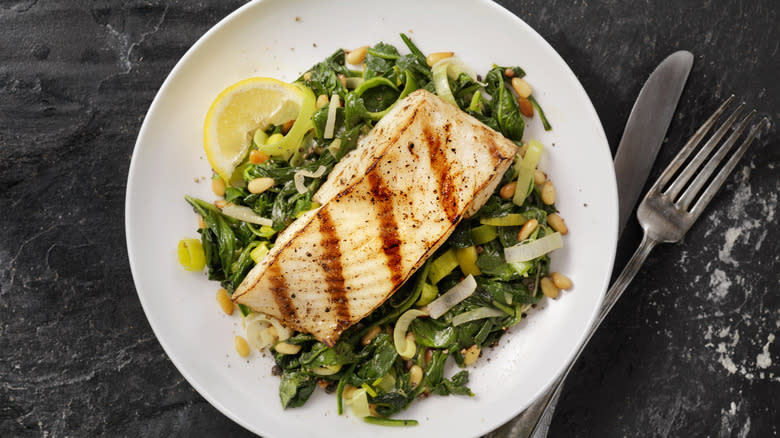
So, you've grilled your fish to perfection and are ready to remove it from the grill. Whether you want to cut up your filet before plating it or not, you shouldn't serve it just yet! Allow your fish to rest for anywhere from two to five minutes once it's done cooking.
As with other meats, resting your fish after it's been cooked gives it time to fully soak up the grill juices so it's as juicy and flavorful as possible when it's ready to be served. Fish doesn't need to rest as long as meat before it's served — generally, once it's cooled down enough to eat, it should have had enough time to rest. If you're worried about your fish drying out while it's resting, you can always remove it from the grill a little bit early. Generally, though, if you're only leaving your fish to rest for a few minutes, you shouldn't need to worry about cook time.
Choosing Low-Quality Fish
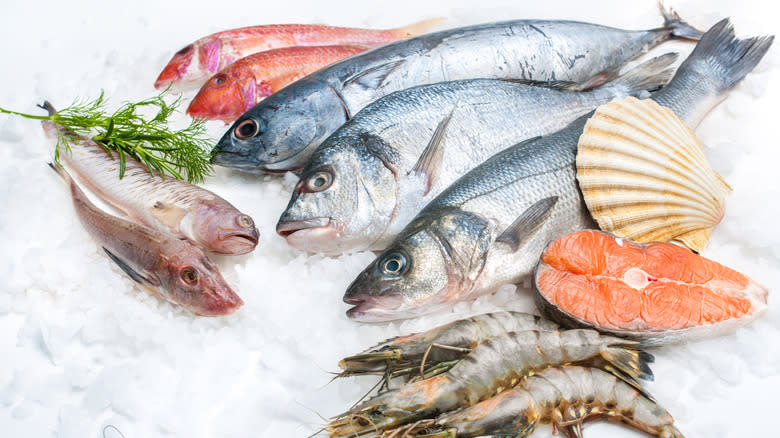
If you're noticing that your grilled fish tastes ... well, fishy, that's not actually something you can change by grilling. The quality of the fish you purchase will influence the final taste of your dish. If you're just not getting the flavor you're after, the problem is likely with the fish itself. It's one of the main reasons Ray's Boathouse buys fresh fish directly from Seattle fishermen — that's the absolute best way to guarantee your fish will taste perfect every time. Whenever possible, buy your fish fresh from a local fishmonger to get the highest quality cuts of fish.
When choosing a good fish to buy, avoid any with cloudy eyes — this is a sign they're no longer fresh. The fish also shouldn't smell fishy, so if you're already picking up this scent from your cut, it's a bad sign. Generally, fish shouldn't smell like anything at all except maybe a light salty scent. If you're buying fish filets, they should be nice and firm — again, you can smell the filets to make sure you're not picking up on anything fishy. When in doubt, don't be afraid to ask fishmongers for help picking a good filet. They'll be able to help you find some that will grill nicely for your skill level.
Looking for more tips? Check out Mashed's exclusive interview with chef Robert Irvine.
Read the original article on Tasting Table

 Yahoo Lifestyle
Yahoo Lifestyle 
